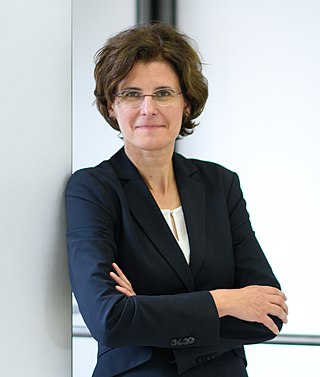
The University of Mannheim, abbreviated UMA, is a public research university in Mannheim, Baden-Württemberg, Germany. Founded in 1967, the university has its origins in the Palatine Academy of Sciences, which was established by Elector Carl Theodor at Mannheim Palace in 1763, as well as the Handelshochschule, which was founded in 1907. The university is regularly ranked as one of Germany's best business school as well as a leading institution in economics and social sciences.

Hans-Werner Sinn is a German economist who served as President of the Ifo Institute for Economic Research from 1999 to 2016. He currently serves on the German economy ministry’s advisory council. He is Professor Emeritus of Economics and Public Finance at the University of Munich.

The German Institute for Economic Research, or, more commonly DIW Berlin, is a economic research institute in Germany, involved in basic research and policy advice. It is a non-profit academic institution, financed with public grants from the Berlin Senate Department for Economics, Technology and Research and the Federal Department for Economics and Technology. DIW Berlin was founded in 1925 as the Institute for Business Cycle Research and was later renamed.

The Kiel Institute for the World Economy is an independent, non-profit economic research institute and think tank based in Kiel, Germany. In 2017, it was ranked as one of the top 50 most influential think tanks in the world and was also ranked in the top 15 in the world for economic policy specifically. German business newspaper, Handelsblatt, referred to the institute as "Germany's most influential economic think tank", while Die Welt, stated that "The best economists in the world are in Kiel".
The RWI – Leibniz-Institut für Wirtschaftsforschung, Essen is an independent economic research institute and think tank in Essen, Germany. Founded in 1926, the RWI maintains a non-profit status, mainly funded through public means while also receiving third-party-fundings. It conducts research on economic development, assists policy-making, and fosters economic literacy for the public. The RWI currently employs 120 people and is part of the Leibniz Association, a group of non-university research institutes in Germany.

Clemens Fuest is a German economist who has been President of the Ifo Institute for Economic Research and director of the Center for Economic Studies at the University of Munich (LMU) since 2016.

The National Library of Economics is the world's largest research infrastructure for economic literature, online as well as offline. The ZBW is a member of the Leibniz Association and has been a foundation under public law since 2007. Several times the ZBW received the international LIBER Award for its innovative work in librarianship. The ZBW allows for access of millions of documents and research on economics, partnering with over 40 research institutions to create a connective Open Access portal and social web of research. Through its EconStor and EconBiz, researchers and students have accessed millions of datasets and thousands of articles. The ZBW also edits two journals: Wirtschaftsdienst and Intereconomics.

Kai A. Konrad is a German economist with his main research interest in public economics.

Axel Ockenfels is a German economist. He is professor of economics at the University of Cologne. He also is Director of the Cologne Laboratory of Economic Research, Speaker of the "University of Cologne Excellence Center for Social and Economic Behavior ", and Coordinator of the DFG research unit "Design & Behavior".

Christoph Matthias Schmidt is a German economist. He has been President of RWI - Leibniz Institute for Economic Research in Essen since 2002 and also holds the Chair for Economic Policy and Applied Econometrics at the Faculty of Management and Economics at the Ruhr-Universität Bochum. He was a member of the German Council of Economic Experts from 2009 to 2020 and its chairman from 2013 to 2020. Since 2019 he has been a member, and since 2020 co-chairman, of the Franco-German Council of Economic Experts. From 2011 to 2013, he was a member of the Enquete Commission "Growth, Prosperity, Quality of Life" of the German Bundestag. From 2020 to 2021 he was a member of the "Corona-Expertenrat" of the Minister President of North Rhine-Westphalia. He has been a member of acatech – Deutsche Akademie der Technikwissenschaften since 2011, a member of the presidium since 2014, and vice president since 2020. He is a member of the National Academy of Sciences Leopoldina, the Mainz Academy of Sciences and Literature and the North Rhine-Westphalian Academy of Sciences and Arts.
The Center for European, Governance and Economic Development Research (cege) is an interdisciplinary research institute of the University of Göttingen, Germany. The cege was founded in 1999 by Prof. Dr. Renate Ohr. It analyzes European and global economic structures, the effects of economic incentives on a national and international scale, as well as with processes of growth and development in developed and developing countries.

Lars Peter Feld is a German economist who currently serves as director of the Walter Eucken Institut and as Professor for Economic Policy at the University of Freiburg. From 2020 to 2021 he also chaired the German Council of Economic Experts. Federal Minister of Finance Christian Lindner made Feld his personal economic policy advisor in February 2022.
The Mannheim Centre for Competition and Innovation (MaCCI) in Mannheim, Germany is a research association of ZEW and the Faculty of Law and Economics at the University of Mannheim. The aim of MaCCI is to foster interdisciplinary research in the area of competition, regulation and innovation policy. MaCCI research contributes to fundamental problems in economics and law as they apply to competition, economics of innovation, and regulation. Core research topics include digital markets and platform economics, competitive effects of mergers and acquisitions, consumer search, public and private enforcement of competition law and innovation. About 70 researchers are members of MaCCI. Each year, MaCCI (co-)organizes a number of conferences and workshops for both young and experienced researchers to strengthen the exchange between researchers in the fields of law and economics. Detailed information on MaCCI activities and events can be found on the MaCCI website and the annual Activity Reports and MaCCI Letters, which contain three research highlights by MaCCI members each year.

Isabel Schnabel is a German economist who has been serving as a member of the Executive Board of the European Central Bank since 2020.
Andreas Löschel is a German economist currently holding the chair of Energy and Resource Economics at the University of Münster. He is the director of the Centre of Applied Economic Research Münster (CEAW). His research interests include applied microeconomics, energy economics and the economics of climate change. He is ranked among the most influential economists in his field. In an annual Frankfurter Allgemeine Zeitung Ranking, he is among the 25 most influential economists in Germany.

Irene Bertschek is a German economist and head of the Research Department Digital Economy at the ZEW – Leibniz Centre for European Economic Research in Mannheim. She holds a professorship of economics of digitalisation at University of Giessen and is a member of the Commission of Experts for Research and Innovation (EFI), advising the Federal German government.
Eckhard Janeba is a German economist and professor at the University of Mannheim. He is also a member of the Board of Academic Advisors to the Federal Ministry for Economic Affairs and Energy.
Monika Schnitzer is a German economist and chair of comparative economic research at the Ludwig Maximilian University of Munich. She was the president of the Verein für Socialpolitik from 2015 to 2016 and is the chairwoman of the German Council of Economic Experts since 2022.
Nicolas Robert Ziebarth is a university professor at the University of Mannheim and the ZEW- the Leibniz Centre for European Economic Research. Since 2022, he is head of their Research Unit "Labour Markets and Social Insurance." Since its founding in 2021, he served as a tenured Associate Professor in Cornell's Brooks School of Public Policy and the Department of Economics. Prior to that, he was an Assistant Professor (2011-2017) and then tenured Associate Professor (2017-2021) in Cornell's Department of Policy Analysis and Management.












